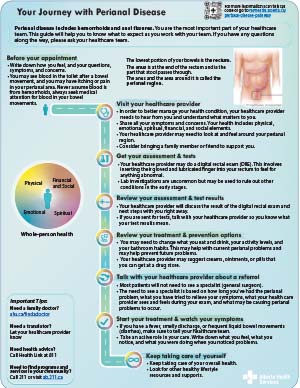Taking steps to prevent perianal problems like hemorrhoids and fissures is the most important thing you can do to manage these conditions. Perianal problems often return after treatment if you do not make any changes to your diet, activity, and bathroom habits. In some cases, you may need surgery to repair a perianal problem, but this is also only a temporary fix if you do not also make lifestyle changes.
Preventing perianal problems
Eating and drinking
Eat enough dietary fibre and drink enough non-caffeinated, non-alcoholic fluids to have healthy bowel movements. Learn more about
getting enough fibre. You can also use fibre supplements like psyllium fibre to meet your dietary fibre needs. It is important to drink lots of water when taking fibre supplements.
Your healthcare provider may recommend that you see a dietitian. You can also call Health Link at 811 and ask to talk to a registered dietitian.
Healthy bathroom habits
Sitting on the toilet for a long time can lead to hemorrhoids and anal fissures. Pushing or straining too hard to have a bowel movement (often due to
constipation) can also create perianal problems.
A helpful way to remember healthy bathroom habits is TONE:
-
T – Three (3) minutes or less on the toilet having a bowel movement.
-
O – One (1) bowel movement each day.
-
N – No straining and no mobile phone use or reading on the toilet.
-
E – Enough dietary fibre. If you get enough fibre, the 3 other habits above will be easier.
Activity, rest, and weight
Your healthcare provider may discuss activity and weight recommendations with you. Being active can help prevent constipation as it promotes bowel movements. The
Canadian 24-Hour Movement Guidelines give recommendations for physical activity, and your healthcare provider may recommend some specific exercises for you to start with. Always consult your healthcare provider before starting a new activity program.
Rest is also important to allow perianal problems to heal.
Maintaining a healthy body weight is important for many factors of your health and wellbeing. Being overweight or having obesity can put extra pressure on the blood vessels in your bowels, which can lead to perianal problems like hemorrhoids. Your healthcare provider is available to support you if you want to explore healthy weight loss options.
Hygiene practices
Shower and bathe regularly to keep your perianal area clean. Do not irritate your perianal region with too much washing, as that can make perianal issues worse. Be gentle. Use warm water and a fragrance-free soap, or use baby wipes or medicated pads.
Wear cotton underwear and loose clothing to decrease moisture and rubbing around your perianal area. Avoid thong-style underwear.
Managing symptoms and treating perianal problems
Perianal problems can cause a range of symptoms from itchiness to pain. The options to make yourself more comfortable are all focused on reducing swelling and lubricating the area. Find more suggestions at
hemorrhoids care instructions.
Sitz bath
A sitz bath is a shallow warm-water bath that you sit in. The warm water can help ease pain by relaxing the muscles around your anus and increasing blood flow to the area. This can help the healing process.
You do not need any special equipment for a sitz bath. To do a sitz bath, sit in shallow warm water for 10 to 15 minutes several times a day. Do not add anything to the water like Epsom salts or bath oils. Just use warm water about 40°C (104°F), not hot water. After each bath, pat the area dry (do not rub).
Over-the-counter creams and ointments
Non-prescription, also called over-the-counter, creams and ointments can be used to relieve your symptoms, like itchiness. They can also lubricate your perianal area to help you pass stool during a bowel movement. Over-the-counter hemorrhoid creams and ointments are available in most pharmacies. These creams and ointments are not a cure for hemorrhoids.
Many creams and ointments can be applied to the perianal region and internally (inside the anus and rectum). Some people prefer to wear a disposable glove when applying these creams and ointments. You can buy disposable gloves at your local pharmacy.
Follow the product directions when using over-the-counter creams and ointments. If you have questions about these products and how to use them, ask a member of your healthcare team, like your doctor, nurse, nurse practitioner, or pharmacist.
Always seek medical advice for hemorrhoids that become painful, bleed, or do not go away on their own after 2 weeks.
Prescription medicines
Your healthcare provider may prescribe ointments and medicines for constipation or to treat hemorrhoids or anal fissures. Speak with your pharmacist about the correct way to apply creams and ointments, and how to take prescription medicine.
Medicine review
Some medicines that you take for other conditions may cause constipation. Your healthcare provider may want to change your medicines to ones that are less likely to cause constipation.

Perianal Disease Pathway
Download or print the
full patient pathway (PDF) and
summary (one-page PDF) to learn more about how to prevent, manage, and treat perianal problems.
Patient Pathway  Summary
Summary 
